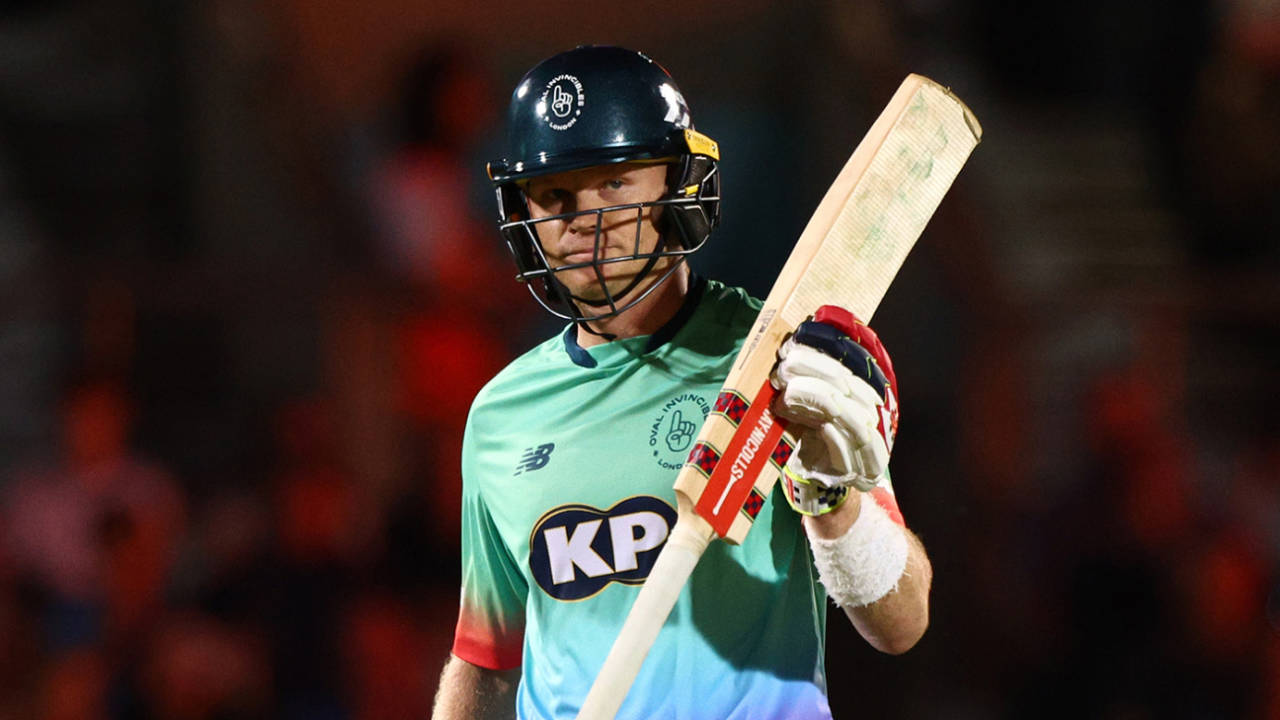Oval Invincibles and former Kent captain says big clubs have ‘moral responsibility’ to non-host venues
Sam Billings captained Oval Invincibles to the Men’s Hundred title last year • Getty Images
Sam Billings has called for a fair distribution of revenues from the ECB’s proposed sale of stakes in Hundred teams to private investors, and believes that the biggest clubs have a “moral responsibility” to ensure that all 18 first-class counties can thrive.
There is broad agreement between the ECB and the counties that stakes in the eight Hundred teams should be sold later this year. But there are still some sticking points over the proposed distribution of funds: the 11 counties who do not host a Hundred team are seeking independent advice to ensure that they get a fair deal from the seven Hundred-hosting counties and MCC.
Billings, who led Oval Invincibles to the men’s Hundred title last year, spent six years as Kent’s club captain and believes that private investment could prompt “the revitalisation” of county cricket. But he fears it could be “very worrying” for a club like Kent if the distribution of funds entrenches the existing financial disparities between bigger and smaller counties.
“The Hundred is here to stay,” Billings told ESPNcricinfo, speaking at the Hurlingham Club where he was competing in the Alfred Dunhill Padel Classic. “With private investment, if the money that is going to come into the game is used correctly – and that is the key thing – then it could benefit everyone incredibly, and be the revitalisation of county cricket and of cricket in this country.
“I’ve benefitted from the county system from the age of seven and it has produced so many players from every single corner of the country. Kent means the world to me. They’ve given me everything in my cricketing career and it’s my duty to do everything I can to try and repay that club and leave that in the best place possible.”
Billings has captained Oval Invincibles since the Hundred’s inaugural season and says that he has always seen the team as “a joint venture” between Surrey and Kent. Kent have provided several players to the Invincibles, while their chief executive Simon Storey sits on the board and their coach, Matt Walker, is one of Tom Moody’s assistants.
“I went into the Hundred as an individual, but with the Oval Invincibles being a Kent-Surrey joint venture, a partnership,” Billings said. “The cricketing structure, the backroom staff, the committee: it is all provided by Kent and Surrey, and based at The Oval. It has to be a relationship between all parties, and it just has to be fair.
“Kent outshine a lot of the Test-match grounds in terms of producing England cricketers recently – in both the male and female game – by a country mile. That is a key quality of everything we do at Kent: it has always been about trying to produce homegrown cricketers to play for England. If you don’t want to invest in that, that could be very worrying for the bigger picture overall.”
The latest proposals involve the seven host counties and MCC being handed 51% of the shares in their respective Hundred teams, and they will then choose how much – if any – of those they wish to sell. Oli Slipper, Surrey’s chairman, has told the club’s members that he wants to change the Hundred team’s name to ‘Surrey Invincibles’ if they become majority owners.
But Billings is unequivocal: “That just shouldn’t happen,” he said. “Look, Surrey is a fantastic club and I haven’t got a bad word to say about them. They are the gold standard for any county cricket club from a business point of view and their production line of England cricketers is arguably the best in recent years.
“But being such a powerful player in the game, you’ve got to use that as an opportunity to uplift others who need it more – you’ve got a moral responsibility, in my opinion. I haven’t been in the counties’ meetings on the Hundred but I hope that the big clubs balance their own ambitions with making sure it’s a fair deal for everyone – and for English cricket as a whole, not just individual entities.”
Kent were overlooked by the ECB last month when bidding to host a ‘Tier One’ women’s team from 2025, a decision that their chairman Simon Philip said was “difficult to swallow”. The club’s second home at Beckenham, in south-east London, formed a key part of their unsuccessful bid and a significant dividend from the sale of Hundred teams would help Kent to fund their plans to invest in facilities there.
“Beckenham is really exciting in terms of the potential of the club,” Billings said. “It should be right at the forefront of our plans both for the male and female game – it has to be. We’ve got three million people in the local catchment area and it’s a great opportunity for Kent.”
Matt Roller is an assistant editor at ESPNcricinfo. @mroller98


